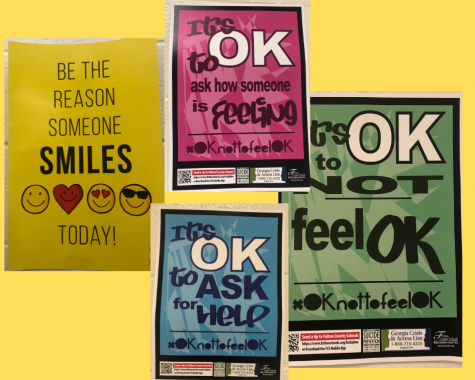Why are teens so sad?
January 28, 2020
Recently school hallways have been flooded with posters promoting self-care and reaching out for help. This seems like a wonderful thing, but these efforts have been implemented to fight the rise in teenage depression, anxiety, and suicide rates.
Additionally, finding psychiatric care for children and teens has become increasingly difficult as offices are slammed and booked full for months. But what has caused this exponential increase, and what could impact so many people’s emotions so harshly? This is a difficult question that has stumped scientists and doctors, especially since more and more information is being discovered about how mental illnesses, such as depression and anxiety, can be genetic predispositions.

While there is not yet a concrete answer to this predicament, I feel that the following three issues play the largest role in the growth of depressed kids: higher divorce rates, better access to news coverage, and the implementation of gifted programs nationwide.
Divorces becoming more common and socially acceptable can be considered a positive thing, however, it leaves behind thousands of children who feel abandoned or caught in between two separate households. Millennials and Gen Z kids are the first generations in the United States to have grown up with the effects of widespread divorces, and those feelings of parental abandonment have increased along with separation rates.
One look at popular social media platforms such as Twitter or Tik Tok, and immediately there are hundreds of trending jokes about dealing with trauma from growing up in a home with constant fighting, typed up in Comic Sans and posted next to a Kermit the Frog meme.
On top of all that emotional baggage, children have access to the news like never before. Again, this is an amazing thing, but one that comes with major drawbacks as well. Kids should be educated about what happens in the world, international affairs, and even some true crime.
However, children are being absolutely flooded with news stories of fires, home invasions, mass genocides, and the horrors of war from increasingly younger and younger ages. Not only does this desensitize them from violence, it also provides a sense of hopelessness to be constantly reminded how helplessly damaged the world can be. No one wants to report on picnics and good deeds, so no kids are exposed to the good old ‘fireman saves a kitten in a tree’ story, just an overwhelming, constant stream of human cruelty.
Additionally, some millennials, but mostly Gen Z children, have been the first to experience the huge push towards increased talented and gifted programs. Technically, these programs have been around since about the 1960s, but recent generations have been introduced to things such as helicopter parents and STEM-based education, meaning more and more kids get lumped into gifted programs.
These programs are usually for elementary and middle schoolers and can be separate classes where “gifted” children are removed from the whole group once a day. There are also entire schools built to accommodate kids who “think differently” that usually have smaller class sizes, more hands-on learning, and a faster-paced learning style.
While this does have inherent benefits, it also acts as a sort of safe bubble, where kids are only put with people exactly like them, never taught to study, and are told daily how special they are. As a gifted program alumni myself, I have noticed that my friends struggle with those same issues. When you’re seven years old and read at a college level you’re a star, but when you’re a 16-year-old AP student, it’s expected. Going from the top of all classes to a mere average in the eyes of the College Board is a hard transition many kids struggle with.
While truly no one is sure why many teens are so incredibly depressed, rise in divorces, increase in news availability, and gifted programs are what I have observed to play a part in upsetting kids. Regardless of what causes this issue, it’s still an issue. If you or anyone you know is feeling helpless, depressed, or suicidal, the National Suicide Hotline number is 1-800-273-8255, and can be reached 24/7.

